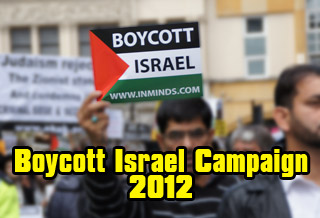
 Innovative Minds © 2014. All Rights Reserved. www.inminds.co.uk | ||||
The only weapon availableHilary Rose, The Guardian
South African leaders, from Ronnie Kasrils, the Jewish ex-head of the armed wing of the ANC to Bishop Desmond Tutu, declare that the sufferings of the Palestinians are worse than those of black South Africans under Apartheid. Those who know apartheid at first hand are well able to recognise a racist state.
An academic and cultural boycott of Israel is the only way of protecting the Palestinians, says Hilary Rose I am typing this just a few hundred yards from the hall in Holborn where in 1959 the ANC, with most of its leadership in prison or exile, called for an international boycott of apartheid South Africa. Both the ANC - committed to armed struggle - and pacifists like Desmond Tutu saw boycott as their remaining weapon. As we know, this call was initially only answered by civil society - including the British university teachers' union. It took many years before governments, and the UN itself, intervened and Freedom Day finally arrived. Today it is hard to see what weapons, other than the counterproductive, though legitimate, armed intifada (though legitimacy does not extend to suicide bombers killing civilians) the even harder pressed Palestinians have. Their land is occupied, they suffer from illegal house demolitions, illegal settlements in the occupied territories, so-called targeted assassinations which kill civilians, torture and indefinite detention without charge.
Students who once travelled from Gaza to Birzeit University on the West Bank were prevented from completing their studies by the Israeli Defense Forces (IDF). Today Gazans are no longer permitted to study at Birzeit; instead they remain in Gaza, which has become a vast concentration camp. The president of Birzeit was kidnapped by Israeli forces, dumped in Jordan and not permitted to return for many years. The university was shut by the IDF for three years, and even now access is frequently denied for hours or days with sudden roadblocks.
Taxes are gathered by Israel, but not, as international law requires, returned. As a consequence, both education and healthcare services - the infrastructure of civil society - are utterly impoverished. On top of these abuses of human rights is the wall, declared illegal by the international court. The obligation of every state signed up to international law is to help enforce it. European governments sit on their hands, while the US vetoes action through the UN security council. The wall claims to give security to Israelis, but it also separates Palestinian from Palestinian, farmers from their land, children from their schools, students and teachers from their universities. Students who once travelled from Gaza to Birzeit University on the West Bank were prevented from completing their studies by the Israeli Defense Forces (IDF). Today Gazans are no longer permitted to study at Birzeit; instead they remain in Gaza, which has become a vast concentration camp. The president of Birzeit was kidnapped by Israeli forces, dumped in Jordan and not permitted to return for many years. The university was shut by the IDF for three years, and even now access is frequently denied for hours or days with sudden roadblocks. Faced with these brutal abuses Israeli academics, excepting a handful of brave dissenters, have remained silent - less surprising if we understand that Israeli academics serve in the military. One distinguished natural scientist explained to me that he served until he was 55. This is not discussed by Israeli academics, yet for many non-Israelis the image of the small boy terrified in his father's arms deliberately shot by the IDF is printed in our memories. Even within Israel itself, the universities, sitting on occupied Palestinian land, share institutionally in the general discrimination against Arab-Israelis (20% of the population).
Israeli academics, excepting a handful of brave dissenters, have remained silent - less surprising if we understand that Israeli academics serve in the military. One distinguished natural scientist explained to me that he served until he was 55.
In these desperate circumstances it is not surprising that South African leaders, from Ronnie Kasrils, the Jewish ex-head of the armed wing of the ANC to Bishop Desmond Tutu, declare that the sufferings of the Palestinians are worse than those of black South Africans under Apartheid. Those who know apartheid at first hand are well able to recognise a racist state. And all the blustering by the Israel lobby cannot wash this away. The call from Palestinians for an academic and cultural boycott did not come from any political party but from Palestinian civil society itself. They saw that any claim to academic freedom and even the right to education was being destroyed. As members of civil society we have to consider such a moral and political call. Some, like the British Committee for the Universities of Palestine and the solidarity movement, have accepted the challenge. But it doesn't matter that every part of civil society responds in the same way. What matters is that pressure is put on Israel until it complies with international law and works for a just peace. Thus British doctors are questioning the legitimacy of Israel's medical association, which condones torture; artists and filmmakers have called for a boycott, and a galaxy of international architects, including several Israelis and Palestinians, published a challenge on Thursday to Israeli architects concerning their human rights record and their professional ethics. Boycotts and such professional pressures are not fast in their effects, but like water dripping on a stone, eventually the stone wears away. Hilary Rose is the co-convenor of the British Committee for the Universities of Palestine (Bricup). www.bricup.co.uk Source: http://education.guardian.co.uk/higher/worldwide/story/0,,2088442,00.html Also Of InterestPage URL: http://www.inminds.co.uk/article.php?id=10112
|
|
Support Us
If you agree with our work then please support us.Campaigns INMINDS Facebook Live Feed Latest Video's
INMINDS Twitter Feed Tweets by @InmindsComFeatured Video's
You need Flash player 8+ and JavaScript enabled to view this video.
[all videos (over 200)..] Featured MP3 Podcast  "1763 in the Ohio river valley you got Lord Jeffrey Amherst committing to written order an instruction to his subordinate Henry Bouquet, having been defeated by Pontiac Ottawa confederacy in the field. The order essentially says that they have been defeated militarily and is therefore necessary for Amherst forces to request a peace, to sue for peace from Pontiacs people. He instructs Bouquet to convene a parlay with the Indian leadership for that purpose. And as is the custom, as is common courtesy among native populations as was known to the Brits at that time, it would be necessary for those who requested the council to give gifts to those requested to attend. Make those gifts, Amherst says, items taken from a smallpox infirmary in order, I'm going to quote directly now, this isn't a paraphrase: 'in order that we may extirpate this execrable race'. Now key is on this last word, had he said that we might eradicate the opposing combatants, their military capacity, their warriors.. what ever term he wanted to use, it would have been biological warefare. But he didn't say anything about that, he said the 'race'. His intent was to use biological means, to use disease, quite explicitly so, to eradicate an entire population group. And Bouquet was also kind enough to commit to writing in his response the next day, I have done as instructed, dispersing three blankets, two handkerchiefs and sundry other items, hopefully, he says, they will have the desired result. They did.. the lowest estimate of the number of people who died of smallpox as a result of that little gesture of friendship and goodwill is a 100,000!" American Indian scholar, activist in the struggle for liberation of Indigenous Peoples in America On the publication of the book 'A Little Matter of Genocide: Holocaust and Denial in the Americas, 1492 to the Present', 1997 [29min / 10Mb] [all podcasts..] Newsletter Feedback |
 |
 |















































